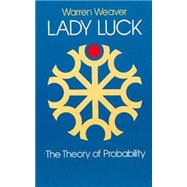
Note: Supplemental materials are not guaranteed with Rental or Used book purchases.
Purchase Benefits
What is included with this book?
Warren Weaver: A Prolific Mind
Warren Weaver (1894–1978) was an engineer, mathematician, administrator, public advocate for science, information age visionary, and author or co-author of many books including the one on which his authorial fame mostly rests, his and Claude Shannon's epoch-making 1949 work, The Mathematical Theory of Communication.
A man with a restless intelligence, he also wrote an early seminal work on the theory of machine translation, a unique work on the publishing history of Alice in Wonderland in the many languages into which it has been translated, Alice in Many Tongues, and the book which introduced the Sputnik generation and their followers to the intricacies and enjoyment of the basic concepts of probability, Lady Luck: The Theory of Probability. This book, first published in 1963, has been a fixture on the Dover list since 1982.
From the Book:
"I say that you may at the moment be almost bored at the prospect of thinking about thinking. But this book is going to introduce you to a special way of thinking, a special brand of reasoning, which, I am confident, you will find not only useful, but fun as well. It will be about a type of thinking that, when stated boldly, seems a little strange. For we often suppose that we think with the purpose of coming to definite and sure conclusions. This book, on the contrary, deals with thinking about uncertainty."
In the Author's Own Words:
"We keep, in science, getting a more and more sophisticated view of our essential ignorance." — Warren Weaver
The New copy of this book will include any supplemental materials advertised. Please check the title of the book to determine if it should include any access cards, study guides, lab manuals, CDs, etc.
The Used, Rental and eBook copies of this book are not guaranteed to include any supplemental materials. Typically, only the book itself is included. This is true even if the title states it includes any access cards, study guides, lab manuals, CDs, etc.